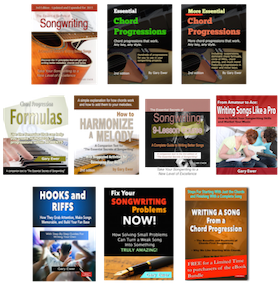“It’s finished, but it just doesn’t sound right, and I can’t tell what’s wrong.“
Is that a familiar feeling? You’re not suffering from writer’s block — it’s more that even though your latest song is finished, it’s just missing something. The energy isn’t there, or the melody sounds scattered, or the chords aren’t working, or… you get the picture.
I’ve written a lot lately about songs that are finished but aren’t working properly, because easily 90% of the emails I’ve received from songwriters in the past few months have been about exactly that issue. Does that describe your most recent songwriting experiences?
In no particular order, here are 5 of the most common solutions that I’ve proposed that have worked to solve these kinds of problems. I wonder if any of these will apply to the song you’re trying to fix right now?
1. If your song has a long verse, you probably don’t need a pre-chorus.
Considering that most songs in the pop genres get to the chorus within the 1-minute mark, and often even by the 45-second mark, a pre-chorus might make the whole verse-pre-chorus package too long. If the end of your verse isn’t connecting satisfyingly to the chorus, a pre-chorus is often the solution. But in long verses, it’s better to fix the end to make a better connection to the chorus rather than lengthen everything by writing a pre-chorus.
2. Repetition of melodic ideas is an important part of making melodies attractive.
A song where nothing repeats is actually hard to do, since we instinctively move toward repetition when we write. But if your song consists mainly of a long, meandering melody where there’s very little repetition, a listener can tire quickly. Such melodies cause boredom and make it difficult for audiences to remember what they’ve heard. Good song melodies use a combination of exact and approximate repetition in melodies as a way of making them much more attractive. (Read this post for more on this important issue.)
 Thousands of songwriters are using “The Essential Secrets of Songwriting” eBooks to polish their songwriting technique. They’re easy to read, filled with tips, ideas, chords and more — all meant to get you writing quickly and easily. Purchasing the bundle today gets you an 11th FREE eBook: “Creative Chord Progressions”
Thousands of songwriters are using “The Essential Secrets of Songwriting” eBooks to polish their songwriting technique. They’re easy to read, filled with tips, ideas, chords and more — all meant to get you writing quickly and easily. Purchasing the bundle today gets you an 11th FREE eBook: “Creative Chord Progressions”
3. Consider co-writing as a solution to songwriting difficulties.
True enough, songwriting is your chance to set your thoughts, feelings and opinions to music. And so you may think that a songwriting partnership would make that harder, since you’d now have to put the other writer’s approach into your song. But assuming you find a partner with whom you really connect, a partnership can actually make things easier. If you find lyrics hard to write, for example, a good lyricist can help find just the right words for your thoughts — words that might not have otherwise occurred to you. They can help speed up the songwriting process, and it usually winds up being a win-win for both.
4. Starting songs from a chord progression might be why your melodies are uninteresting.
Don’t assume that just because you’ve started your song from the chord progression that the melody is automatically going to be boring. Chords-first writing is possible to do well (see here). But uninteresting melodies often happen because you’re so focused on the chords that you forget to switch focus to the melody. Once you get your chord progressions working, move to the melody, and be sure that it has a good shape, uses repetition, and acts as a good partner for the lyric. Remember, people hum melodies, not chords.
5. People rarely blame boring chord progressions for boring songs…
…and neither should they. A boring chord progression simply means that it does what it does in a predictable way. Chords are the one element of music among a very few that don’t need to be adventurous or overly imaginative. There’s nothing wrong with a creative progression that moves in unexpected ways, but innovative progressions are not a necessary part of good songwriting. If you want to be innovative, it’s far better to create unusual lyrics, melodies and production, and let chords be the solid anchor to which everything else is solidly moored.
Written by Gary Ewer. Follow Gary on Twitter

Download “The Essential Secrets of Songwriting” eBook Bundle packages, which includes “From Amateur to Ace: Writing Songs Like a Pro.” High-quality PDF files, readable on desktop, laptop, iPad, iPod, or any other PDF-reading device.











Pingback: 5 Random Songwriting Tips For the Song You Can’t Finish - The Hit Songwriting Formula | The Hit Songwriting Formula